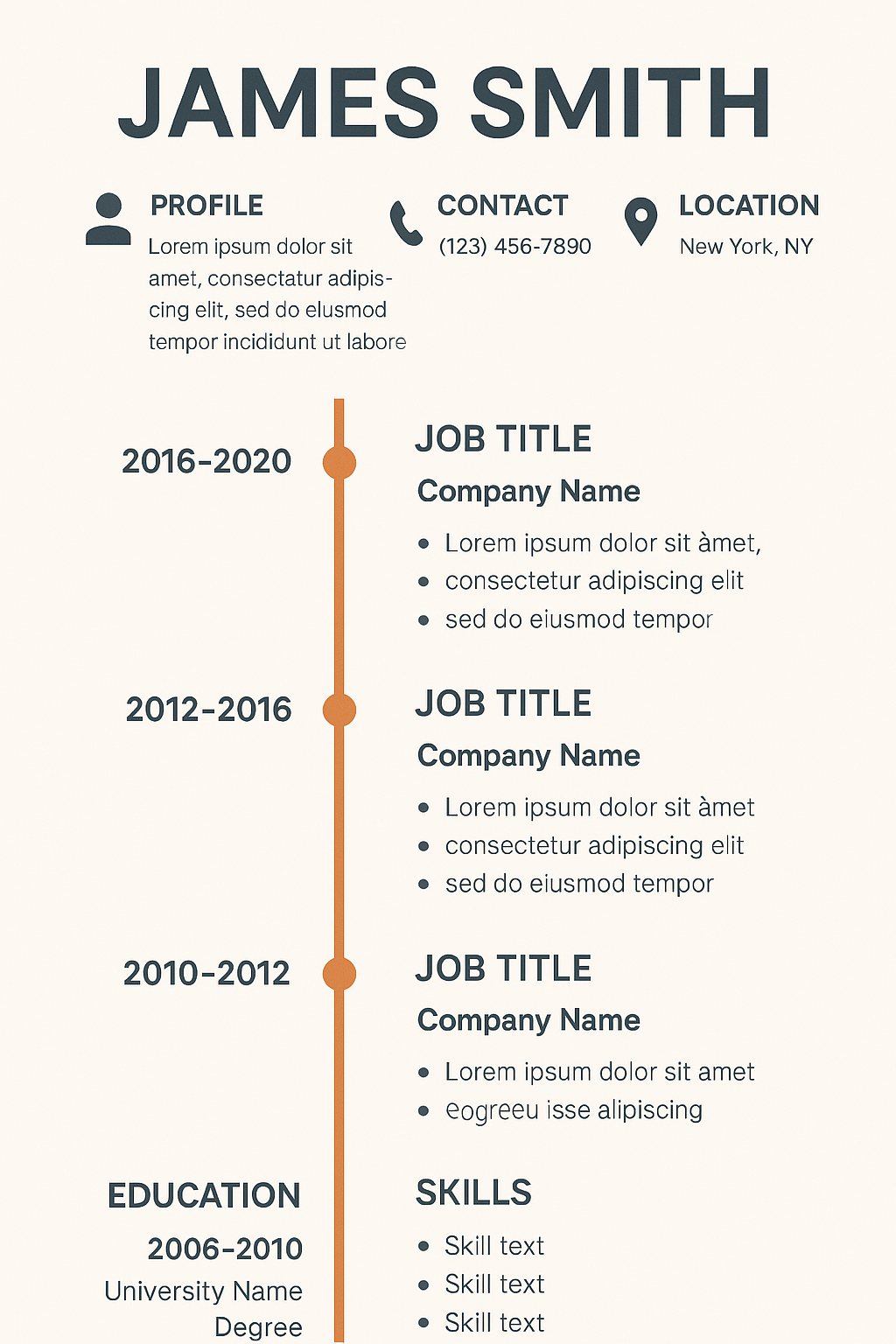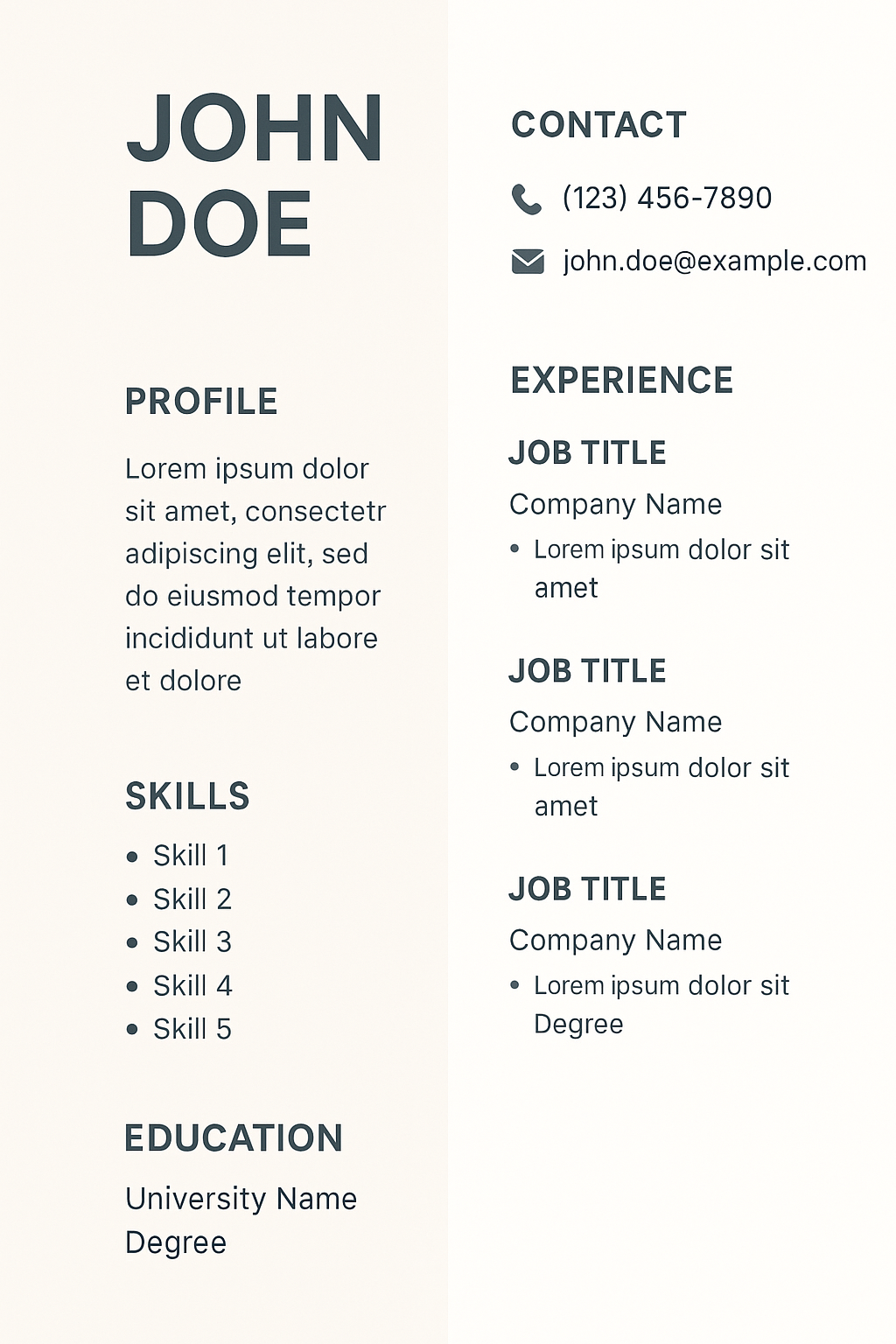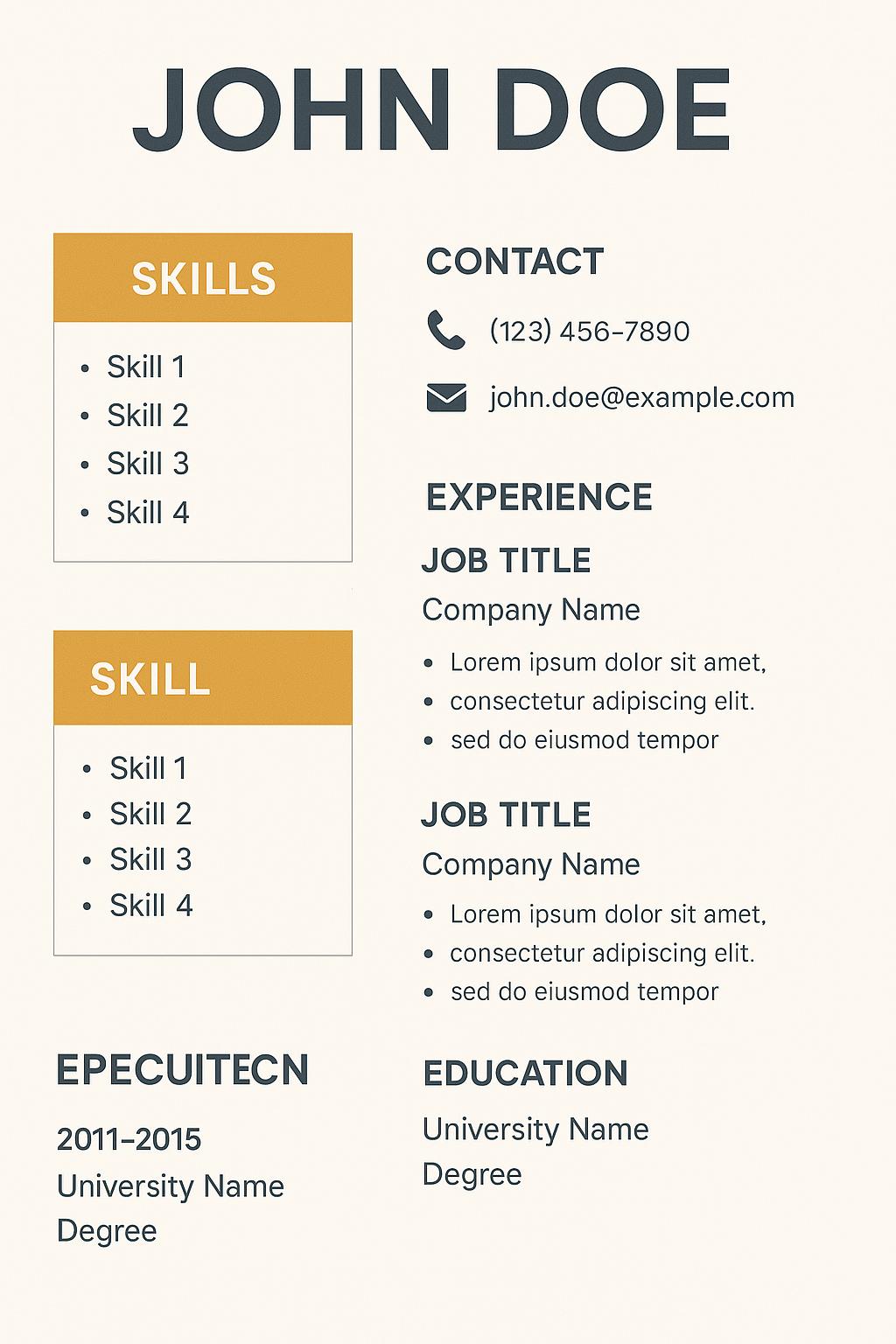How and When to Use an Infographic Resume (With Templates & Tips)
Infographic resumes are quickly gaining popularity as a way to showcase skills and experience visually. Drawing from years of experience in resume design and career consulting, I’ll explain how an infographic resume can help you stand out while remaining professional.
A bright, professionally designed infographic resume can make a lot of difference to your chance of getting employment – provided that you use it in the right way. With the growing popularity of visual resumes, more and more job-seekers use them to stand out from the competition. The supporters of resume infographics say that people are visual creatures and perceive information in pictures better. Yet, if you don't use it right, a resume can make the opposite effect and get you rejected. This article explains when and how to use a visual-first resume, shares impactful examples, and offers design templates you can use for your own resumes!
Today, our expert resume service explores how to apply a visually enhanced resume format effectively and when it's better to opt for a traditional resume. We will also inform you about the benefits of each resume type so you could make an informed choice about which type fits your career needs better. And if you understand the importance of a professional resume for your career, we can create both resume types, highlighting your unique career history.
What Is an Infographic?
Infographic resume definition - a visual representation of your professional background, skills, and achievements, designed using graphics, icons, charts, and layout techniques. Unlike traditional text-based résumés, a visual resume uses visual storytelling to highlight key information quickly and engagingly.
Infographic CV features:
- Use of icons and symbols to represent skills
- Insertion of the timeline to showcase your professional history
- Reliance on charts and different graphs to illustrate your achievements
- Readiness to use creative layouts and interesting designs rather than traditional formatting
Graphical CV formats are built to help you stand out from the crowd. As competition is high, many candidates consider using a free resume template to create their own CVs and enhance job hunt efforts. Yet, not all potential employers will appreciate graphic elements instead of a written professional story. Such resumes are suitable for creative professionals, highly competitive industries, and experiences that are best presented with data-driven achievements.
The whole concept of an infographic resumes is to describe your professional history using visuals rather than words. Visual résumés use graphics, icons, and data visuals like timelines and charts to display the candidate's skills and achievements. They use little words – and those words go in stylish fonts. Visual resumes have no lengthy job descriptions or bulleted lists – they are replaced by colorful charts and other elements. Infographic resumes are considered to convey the information about your past achievements faster and more efficiently, let alone the fact that they typically have outstanding designs.
Infographic Resume Templates and Layout Examples
Looking for visual CV templates? Explore these creative layout examples below and choose the one you like the most! In addition, each example has a brief explanation of resume layout with infographics. If you want a resume infographic download, send us a message and we will find the way to share the template with you. Pay close attention to icons. They are important and should not be randomly inserted!

Timeline-Based Resume
This template is an infographic résumé for designers. It is rather unique.
Layout Highlights:
- Horizontal or vertical timeline
- Visual career progression by year or job title
- Icons for each role or milestone
Best For:
Creative professionals, marketers, designers
Sections:
- Profile photo and contact info
- Timeline of jobs/roles
- Skills bar chart
- Education and certifications

Two-Column Skills-Centric Resume
Layout Highlights:
- Left column: personal info, skills (with bars or circles), languages
- Right column: experience and education with minimalist icons
Best For:
Tech, admin, engineering, project management
Sections:
- Summary
- Core competencies (with visuals)
- Experience (chronological or functional)
- Tools/software proficiency

Circle Graph Resume
Layout Highlights:
- Uses pie charts and circular graphs to rate skill levels
- Clean, modern, and easy to scan
Best For:
Designers, digital marketers, UX/UI professionals
Sections:
- Profile
- Skills with visual ratings
- Career history in clean blocks
- Education
- Optional: awards or publications
Infographic Resume vs Traditional Resume
Now let's take a look at the key differences between creative resume vs. traditional document.
A modern visual resume format helps job seekers present their story in a compelling way ideal for creative industries. It uses icons, charts, and layout tricks to bring attention to key skills, timelines, and achievements in a more engaging way. However, one of the key disadvantages of a resume vs traditional resume is that a creative one may not pass ATS filters if not designed properly.
Traditional resumes, on the other hand, are universally accepted and highly ATS-friendly. It's better for formal or technical roles where clarity, structure, and detail are more important than visual flair. Thus, when deciding between a modern vs traditional resume format, check out the industry standards. Being excessively creative does not always indicate a good sign!
It is very important to keep in mind that if you're applying online through job portals and websites, use a traditional resume instead of a creative one. For direct networking or portfolio submissions, an infographic resume can help you stand out. Many professionals now use both formats depending on the application context. Therefore, it is better to have two formats of your resume to be ready for different situations. The best choice is to keep the design simple and clean, with bullet points and relevant information.
|
Feature |
Infographic Resume |
Traditional Resume |
Profession Suggestions |
|---|---|---|---|
|
Visual Elements |
Uses charts, icons, colors, timelines |
Plain text with minimal formatting |
Infographic: Designers, Marketers |
|
Readability |
Visually engaging, skimmable |
Text-heavy, straightforward |
Infographic: Creative Directors |
|
Customization |
Highly customizable and creative |
Follows standard formats (chronological/functional) |
Infographic: Freelancers |
|
ATS Compatibility |
Often not ATS-friendly unless saved as plain text |
Highly compatible with Applicant Tracking Systems (ATS) |
Infographic: Direct submissions |
|
Best For |
Creative fields (design, media, marketing, freelance) |
All industries, especially corporate, finance, legal |
Infographic: UX/UI Designers, Photographers |
|
Information Depth |
Focus on key facts and highlights |
Allows for detailed descriptions and accomplishments |
Infographic: Entry-Mid creatives |
|
Hiring Manager Impact |
Visually stands out, grabs attention |
Professional and expected by most employers |
Infographic: Visual-first roles |
|
Length |
Typically 1 page, visually dense |
1–2 pages, depending on experience |
Infographic: Portfolio resumes |
Benefits and Downsides
Infographic resumes can be a powerful tool when used appropriately. Their greatest strengths lie in creativity, visual storytelling, and the ability to present your experience and skills in a compelling, memorable format. A resume for a career change is definitely an advantage when you try to enter a creative industry.
However, while creative résumé formats offer big advantages, they come with certain trade-offs, such as limited compatibility with automated Applicant Tracking Systems (ATS), the risk of focusing too much on design over content, and a lack of standard formatting that can confuse more traditional employers. Here is the summary of the main pros and cons of such resumes:
Pros and cons of infographic
|
Pros |
Cons |
|---|---|
|
Grabs attention quickly |
Often not ATS-friendly (may be unreadable by automated systems) |
|
Demonstrates creativity and visual communication |
Not suitable for all industries (e.g., legal, finance, academia) |
|
Highlights key info at a glance |
Can sacrifice detail for design simplicity |
|
Ideal for showcasing design or marketing skills |
Risk of overcomplicating or cluttering the layout |
|
Makes achievements visually impactful |
Hard to update or customize for each job application |
How effective is an infographic? The most reasonable decision is to have your infographic resume as a supplemental document. You can use it sometimes, but not in all situations. Most companies still prefer a traditional format that allows quick and efficient comparison among candidates.
|
Aspect |
Benefits |
Downsides |
|---|---|---|
|
Visual Appeal |
Eye-catching design that stands out from traditional resumes |
May appear unprofessional in conservative industries |
|
Creativity Showcase |
Demonstrates creativity and design skills |
Could distract from the actual content if overdone |
|
Quick Information Scan |
Allows hiring managers to absorb key info faster using visuals |
May sacrifice depth and detail for the sake of layout |
|
Memorability |
Leaves a lasting impression during manual reviews |
Less likely to be parsed correctly by Applicant Tracking Systems (ATS) |
|
Personal Branding |
Reinforces your personal style and tone |
Requires design tools and skills, which not all candidates may have |
|
Customizability |
Highly flexible in structure and presentation |
Time-consuming to create and tailor for each job |
How to Create (Step-by-Step Guide)
If you have decided you do need a creative document, explore these visual résumé tips and learn how to build one from scratch from scratch. If you feel like you do not have enough skills to manage resume design elements by yourself, use a free or paid infographic builder, and be sure to optimize infographic resume for ATS before submitting it! Let's start building your personal brand resume!
Step 1: Define Your Purpose and Audience
You need to begin the process by thinking about your reader. Next, you need to tailor your resume content and design to match the tone, style, and expectations of the industry you're applying to. It can be the case that a storytelling resume format is not acceptable, and HR expects a traditional resume, for example.
Step 2: Gather Key Resume Content
You should first have all the necessary information before you start working on your resume infographic layout. Specifically, you need to type the following:
- Contact information
- Career summary or objective
- Work experience
- Skills (hard & soft)
- Education
- Certifications or achievements
- Optional: portfolio links or personal brand elements
Step 3: Choose the Right Layout
Next, you need to select a layout that is most suitable for your content, which you collected during the previous step. The most popular layouts, according to the infographic resume structure guide, are:
- Timeline resume
- Two-column
- Grid or card-style
- Skill-chart-focused
Step 4: Use Visual Elements Strategically
You do need to incorporate icons, charts, graphs, and color schemes, such as bar charts to represent skills, timelines for professional experience, and different icons to indicate sections. However, you should not use them excessively. Resume design should be pleasing to the reader's eye and be moderately visually striking.
Step 5: Highlight Key Data Points
It is the right time to emphasize numbers and results visually. That is the main objective of this type of resume. For example, instead of saying "Managed a team," show "Led 12-person team" in a bold, graphic format. It is easier for HR managers to perceive quantified achievements in infographics.
Step 6: Use Design Tools or Templates
If you find it difficult to add icons or turn your data into infographics, the next step is to consider using platforms like: Canva (free & user-friendly), Adobe Illustrator (advanced design), Visme or Piktochart (specialized for infographics). You do not have to create your resume from scratch. You can add your data to a template.
Step 7: Test, Export, and Tailor
Finally, review your resume for clarity, consistency, and grammar. It is better to save your resume in multiple formats (PDF for human review, plain-text version for ATS) and check on the results (make sure all elements are displayed correctly).
Author: Editorial Team at ResumePerk.com
Reviewed by: Certified Career Expert
Last updated: November 2025
Recommended reading:
- Build A Designer Resume With A Graphic Design Resume Writing Service
- Custom Resume For A Customer Service Rep


